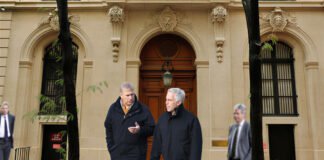Staff at 74 universities across the UK are beginning a 14-day strike over pensions, pay and conditions.
Workers at universities across Britain kicked off 14 days of strikes on Thursday in a battle for the future of education.
UCU union members are fighting over pay, equality, workloads, contracts and pensions. Mark, a striker at Queen Mary, University of London, said the issues “could describe any workplace in the country”.
Workers at 74 universities plan to strike for 14 days throughout February and March. Those at 57 institutions began the action with a two-day strike on Thursday.
There were big picket lines across Britain, with strikers reporting visits from supportive trade unionists and students joining pickets.
The union described this latest strike as “solid”. It follows eight days of action in November and December.
Striking staff were given a boost this morning as the National Union of Students (NUS) said it backed the walkouts and called on university leaders to work harder to resolve the disputes.

UCU said the support from staff and students was despite efforts from universities this week to disrupt the action, confuse the issues and, in some cases, even bribe their staff to cancel protests. The University of Leicester told staff that it would spread the deductions of 14 days’ lost pay for the strikes over three months if staff promised not to protest on campus.
UCU general secretary Jo Grady said: ‘We have been receiving news of solid support for the strikes across the UK. That support sends a clear message to universities that, instead of focusing on silly games and spinning in the run up the walkouts, they should have been working with us to try and sort things out.
‘We have been clear that we are always ready to seriously discuss all the issues at the heart of the disputes. Students are understandably unimpressed at the intransigence of their university leaders and have made clear demands today that vice-chancellors and principals work harder to try and resolve the disputes.’
The UCU says 50,000 of its members will take the action over workloads, pay, a 15% gender pay gap, increased casualisation and changes to pensions for staff in the Universities Superannuation Scheme (USS).
The union is angry members are now having to pay 9.6% in pension contributions, up from 8%, and wants universities to pay the full increase instead.
In addition to striking, union members are taking other forms of industrial action, including working strictly to contract, not covering for absent colleagues and refusing to reschedule lectures lost during the strikes.
Solidarity from around the Labour movement
Len McCluskey and the Unite Union tweeted Solidarity with @ucu members and students on strike for better pay for staff, an end to casualisation and to stop greedy bosses cutting hard-earned pensions ✊ #UCUstrike
The disputes centre on the sustainability of the Universities Superannuation Scheme (USS) and rising costs for members, and on universities’ failure to make significant improvements on pay, equality, casualisation and workloads.
Universities UK (UUK – the universities’ representatives in the pensions dispute) spent the last week running a consultation on a new offer to make to the union. On Tuesday it declared it was not going to make a new offer.
Meanwhile, the Universities and Colleges Employers Association (Ucea – the universities’ representatives in the pay and conditions dispute) said again earlier this week that it would still not talk to the union about the crucial pay element of the dispute.
As well taking to the picket lines, many strikers will be delivering “teach-out” lectures and holding rallies around the country. MPs have been sending messages of support and joining picket lines. A Labour leadership hustings organised by the Guardian in Manchester on Tuesday has been moved from a university venue to Manchester Central because of the strikes. All the latest information is available on the union’s wall of action and via Twitter.
The number of universities being hit by the action is the largest since a nationwide two-day strike in 2016, while the number of strike days is unprecedented. Following the eight-day walkout before Christmas, this latest round of 14 strike days means the total number of walkouts will be 22 by March; higher than the previous record of 14 days in 2018.
What do the official statistics show?
Statistics from the Higher Education Statistics Agency (Hesa) show there were 217,065 academic staff working in universities in 2018-19.
Of these:
- 72,750 (34%) were on fixed-term contracts.
- 29,150 were paid by the hour
- 4,240 were on zero-hours contracts
Universities also employed 222,885 non-academic staff in 2018-19, such as managers, student welfare workers, secretaries, caretakers and cleaners.
When is the action?
The UCU has set out 14 days of action over a period of four weeks:
- Week one: Thursday 20 and Friday 21 February
- Week two: Monday 24, Tuesday 25 and Wednesday 26 February
- Week three: Monday 2, Tuesday 3, Wednesday 4 and Thursday 5 March
- Week four: Monday 9, Tuesday 10, Wednesday 11, Thursday 12 and Friday 13 March
Which universities are affected?
A total of 47 universities have staff taking part in action over both pensions and pay and conditions:
There are some variations on dates to accommodate things like reading weeks. Eighteen of the 74 branches are tweaking the dates they are on strike. A full list of who is out and when can be found here.
#UCUstrike #UCUStrikesBack #UCUStrike #USS #FourFights
Support Independent Journalism Today
Our unwavering dedication is to provide you with unbiased news, diverse perspectives, and insightful opinions. We're on a mission to ensure that those in positions of power are held accountable for their actions, but we can't do it alone. Labour Heartlands is primarily funded by me, Paul Knaggs, and by the generous contributions of readers like you. Your donations keep us going and help us uphold the principles of independent journalism. Join us in our quest for truth, transparency, and accountability – donate today and be a part of our mission!
Like everyone else, we're facing challenges, and we need your help to stay online and continue providing crucial journalism. Every contribution, no matter how small, goes a long way in helping us thrive. By becoming one of our donors, you become a vital part of our mission to uncover the truth and uphold the values of democracy.
While we maintain our independence from political affiliations, we stand united against corruption, injustice, and the erosion of free speech, truth, and democracy. We believe in the power of accurate information in a democracy, and we consider facts non-negotiable.
Your support, no matter the amount, can make a significant impact. Together, we can make a difference and continue our journey toward a more informed and just society.
Thank you for supporting Labour Heartlands












